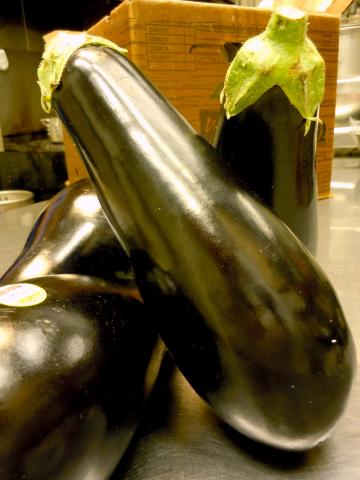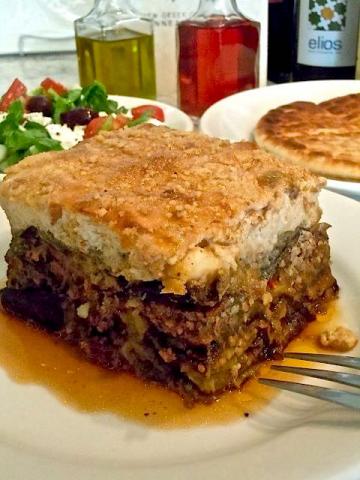A “Traditional Food”, according to the European Parliament means that a food’s ingredients, composition, production or processing can be shown to be transmitted through generations. A food is considered “traditional” if it has been known “since before the Second World War”. (16-03-2006)
And so, a quick check on the history of eggplant and its nutritive value; a look up of regional eggplant recipes from the Balkans, Turkey, the Levant and Southern Europe and a review of several authors’ take on Mousaka and its “origins” and we still have a dish of separately prepared foods—broiled eggplant, spiced minced meat, and fluffy light Béchamel—layered in a pan and oven baked—a flavorful, rich, torte-like repast nearly psychotropic in its enjoyment.
Eggplant, a member of the tomato, potato, bell pepper and even the tobacco family, most likely originated in the India-Burmese (Myanmar) region all the way to Southwest China. One of the earliest cultivars, eggplant is mentioned in Chinese manuscripts circa 500BCE and Hindu scripture 300BCE.
Spread by trade routes and military conquest, the eggplant moved westerly appearing in Greece and Europe by the 12th century. Tomatoes, also associated with this dish, didn’t arrive in Greece until 1818, on the other hand. The first (tomato-less) Moussaka, Maghmuma, is credited to the Arab and the first published recipe for Moussaka by the Turkish Turabi Efendi in 1862 in the Turkish Cookery Book. But Turkish Moussaka is more like a ragout with green peppers and the Arabic version derives its name from “chilled” as it is eaten cold.
It wasn’t until the early 1920’s that Greek Mousaka got its recognizable Greek presentation by the French educated Istanbulian born Greek, Nicholas (Niko) Tselemendes. Tselemendes whose name is synonymous with Modern Greek cuisine, led the movement to “free” Greek cuisine from its Anatolian/Eastern influence and to realign it with Europe’s more urbane palate. Thus he stripped his recipes of some of the more flavorful spices and herbs and topped his dish with béchamel.
Mousakas (Μουσακας—accent on LAST syllable) at the Gardens is three layers of broiled eggplant (with skins intact), alternated with two layers of our meat sauce prepared from pasture raised beef, onions, fresh tomatoes and spices topped with Béchamel (made from organic milk, butter, eggs,imported kefalotyri (sheep’s milk) cheese) and pita crumbs baked golden brown.
What about the psychotropic experience in eating Mousaka? A member of the Deadly Nightshade family which includes tobacco, Solanaeceae melongena, the seeds of the eggplant actually do contain the psychotropic drug, nicotine alkaloid (uncooked). Eggplant’s purple skin, on the other hand, contains the phytochemical anthocyanin which is anti-carcinogenic in nature. Its flesh contains high quality dietary fiber and even more importantly, its phytonutrients have been shown to reduce serum cholesterol and to aid in blood flow.
In all, considering its extensive history and development; its multi-step preparation and production; as well as its surprising nutritional benefit—there is a lot of fuss to Moussaka, so enjoy with family and friends. As Plutarch wrote, “we don’t sit at the table to eat; we sit at the table to eat with friends. Kali Orexi!

